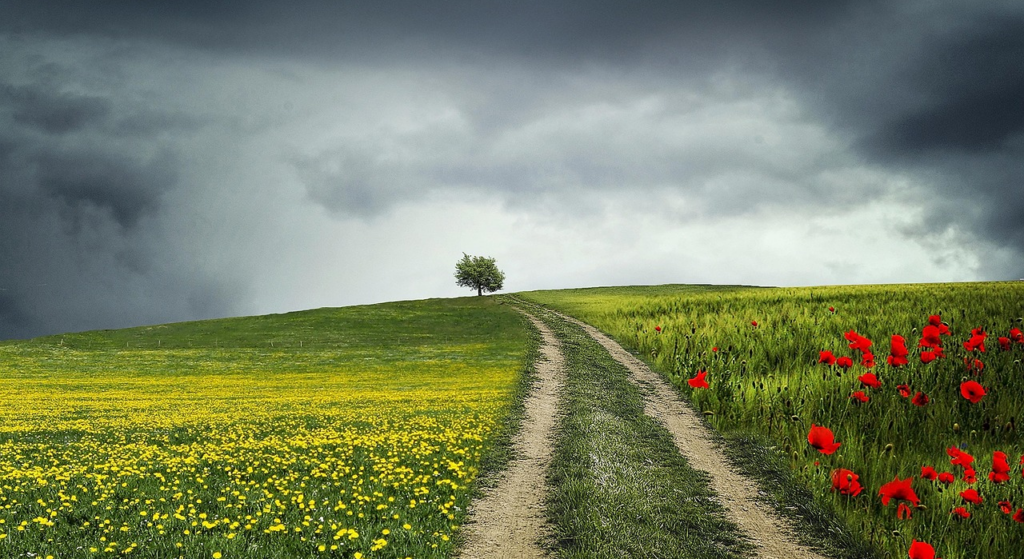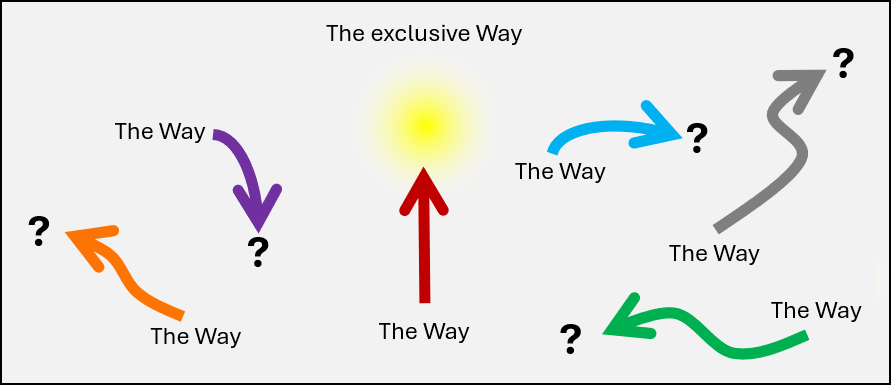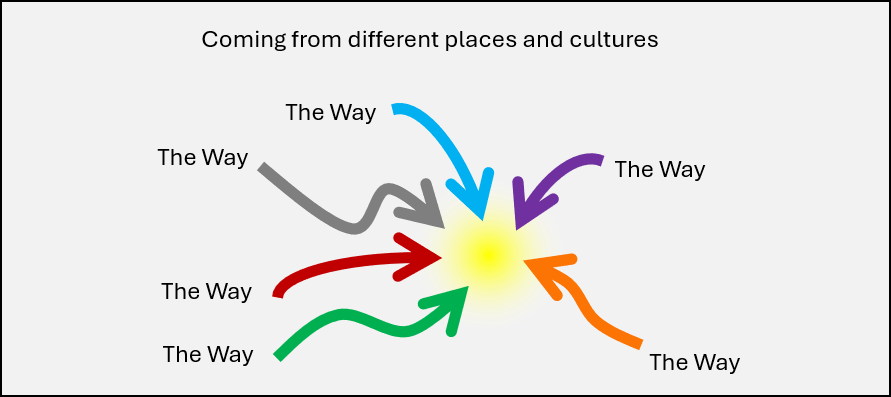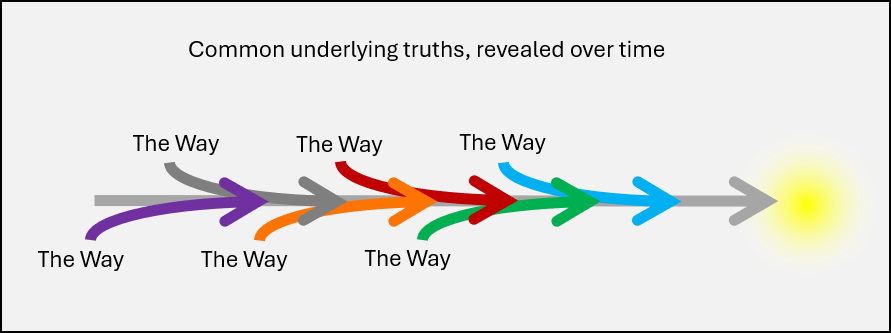How can there possibly be only one path to God?

All roads lead to Rome, as the saying goes. So, can’t all spiritual paths lead us to the ultimate Truth? Well, maybe not all of them. Not the dead-end streets, back alleyways, and cow paths of cults, superstition, and false prophets. But surely there must be more than just one way. The world’s major religions have stood the test of time, with countless followers through the centuries. How can just one of these be right and all the others wrong? Is there no inclusive way?
And yet, we read in the Bible: “Jesus saith unto him, I am the way, the truth, and the life: no man cometh unto the Father, but by me.” [1] To many Christians, this is clear proof there is only one way to God, and that’s through Jesus. The way is exclusive, for Christians only. End of story.
Funnily enough, though, you can find similar exclusive statements in the scriptures of other world religions. For example:
Buddhism: “This is the path. There is no other that leads to vision.” [2]
Zoroastrianism: “There is only one religious way. The one way is that of good thoughts, good words, and good deeds, the way of heaven, of light and of purity, of the infinite Creator.” [3]
Hinduism: “Abandoning all duties, come to me alone for shelter.” [4]
Islam: “The true religion with Alláh is Islam…” [5]
Bahá’í Faith: “He that hath Me not is bereft of all things. Turn ye away from all that is on earth and seek none else but Me.” [6]

Each one seems to offer just one single path to what is good and true, an exclusive way, for their followers only. Which means all the others must be wrong or misguided, right? Is there no other possible way to interpret this, or are those who are looking for an inclusive way just kidding themselves?
Changing Perspective
Growing up a Christian in predominantly Buddhist Thailand, I had to confront this question early in life. All these Buddhists around me — shopkeepers, bus drivers, schoolkids, police officers, nurses, and more — seemed to be pretty decent, friendly people for the most part. Were they really going to burn in hell for all eternity? It hardly seemed fair. Over the years, I’ve believed that there must be more to the story, some explanation for the “I am the way…” Bible verse.
A few years ago it dawned on me there could be another way to understand what Jesus was saying. The question is, who is the “I” in that sentence? Could it be the same “I” as in other “I am…” statements in the Bible? For example, when Moses asked the identity of the voice in the burning bush, the answer came back, “I am that I am. … Thus shalt thou say unto the children of Israel, I Am hath sent me unto you.” [6]
Most Jews and Christians believe this was the voice of God speaking through the burning bush. In a similar way, in the book of John, Jesus makes statements like “I am the bread of life.” [7 ] and “I am the light of the world.” [8] and “I am the door.” [9] Could this not also be the voice of God speaking through Jesus?
Maybe we can ask ourselves, was Jesus trying to point the people to Himself as a person or to God as a spiritual reality? Did He not say, “…Why callest thou me good? there is none good but one, that is, God:…” [10] When He said “I am the way”, could this not mean He was identifying His person with something so much greater? And what about when He said, “I am the resurrection and the life.” [11] before He was even crucified and resurrected? Surely, this must have been the voice of God speaking through the person of Jesus.
Different places, cultures, and names, same goal
For those who believe in God and believe that God can do anything if God can speak through one individual, could He not speak through others? What about the centuries and millennia before Jesus? And those continents and areas beyond Judea? Did God not have a message for those people? Were they not included?
Many believe that people in different places and circumstances were guided by Prophets or Messengers suitable for them. The message those Prophets brought was appropriate for that culture, lived experience, and mindset. Yet each message marked out a path to human fulfillment, a way to our Source and Goal, to eternal Truth, often called “God.”
And what about this concept and the name “God”?
The Hindu tradition has many names for God, such as Brahma, Vishnu and Shiva. Christians use different names, too, like Jehovah, or Father, Son, and Holy Spirit. Muslims refer to Alláh, meaning “the deity” or “the God”. In Jewish tradition no name is spoken, but their scripture uses letters, translated as YHWH. Buddha did not speak of God at all because, according to some scholars, there was so much confusion around that topic in His time. But He did refer to the Uncreated responsible for creation.

Whatever the conception or name of the Goal, the followers living in different places and growing up in various cultures believe their Messenger is the Way. And each Messenger said as much. One way this could be true is if each of these various paths leads to the same Destination.
Common truths, revealed over time
There is still more to the story. In many cases, these Messengers came in a series. over a period of time. We are most familiar with Abraham, Moses, Jesus, and Muhammad, or perhaps Rama, Krishna, and Buddha. According to oral traditions, in some places, there may have been others, but we have no written history of them.
Among the records we do have, these Messengers spoke of how either they would return or another like them would. For example:
Hinduism: “I send forth Myself, from the protection of the good, for the destruction of the wicked and for the establishment of righteousness, I come in to being from age to age.” [12]
Buddhism: “I am not the first Buddha Who came upon this earth, nor shall I be the last. In due time, another Buddha will arise in the world…” [13]
Judaism: “The Lord thy God will raise up unto thee a Prophet from the midst of thee, of thy brethren, like unto me; unto him ye shall hearken;” [14]
Christianity: “I go away, and come again unto you.” [15]
Islam: “Verily We have sent Thee with the truth. A bearer of good tidings and a warner, nor hath there been a people unvisited by its warner.” [16]
Bahá’í: Indeed no religion shall We ever inaugurate unless it be renewed in the days to come. [17]

Looking at the scriptures of each of these religions, we can see how certain underlying truths resonate through them, such as not killing, stealing, lying, or otherwise abusing each other. Love your neighbor as yourself. Don’t get too attached to the material world, but instead, strive to live a life of righteousness, dignity, and honor.
Outwardly, each religion looks very different, with wide variations in rituals, dietary laws, holy day observances, and social organization. But an unbiased observer will see the common underlying truths they share. They all seem to have the same goal — the spiritualization of humanity.
Essential Unity
The latest of these religions, the Bahá’í Faith, takes it one step further. Its Founder, Bahá’u’lláh, said that actually there is an essential unity among all the Founders of the world’s religions. Their inner reality is one and the same. He said, “Inasmuch as these Birds of the Celestial Throne are all sent down from the heaven of the Will of God, and as they all arise to proclaim His irresistible Faith, they therefore are regarded as one soul and the same person.” [18]
From this point of view, they all lead us in the same direction. Each has come from the Creator, and each guides us in the right Way. It is now possible to move beyond the notion of exclusivity and separation, to broaden our awareness, and to discover the unity underlying the superficial differences that once divided us. It can be done. It is now possible to recognize the Way as truly one Way, an inclusive Way.
Notes
- The Bible, King James Version, John 14:6
- Dhammapada 20:274
- The Teachings of the Magi p. 222
- Bhagavad Gita 18:66
- Qur’án 3:17, Rodwell translation
- The Bible, King James Version, Exodus 3:14
- Ibid, John 6:35
- Ibid, John 8:12
- Ibid, John 10:9
- Ibid, Matthew 19:17
- Ibid, John 11:25
- Bhagavad Gita 4:8
- Digha-nikaya, IV.26
- The Bible, King James Version,Deuteronomy 18:15
- Ibid, John 14:28
- Qur’án 35:22, Rodwell translation
- Selections from the Writings of the Báb, p. 159
- Gleanings from the Writings of Bahá’u’lláh, XXII
Originally published by The Way We Live on Medium

